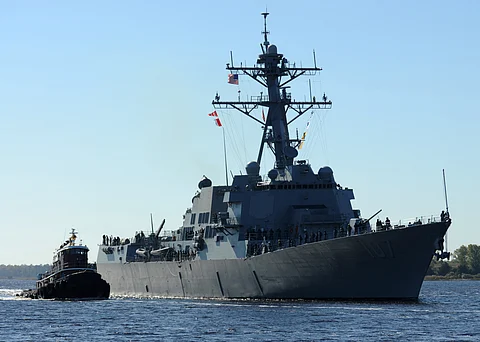

The United States has deployed a significant naval contingent off the coast of Venezuela, heightening tensions between Washington and Caracas. The move follows the Trump administration’s decision to increase its bounty on Venezuelan President Nicolás Maduro to $50 million, a development that has drawn sharp condemnation from the Venezuelan government.
According to reports, the deployment includes three Aegis guided-missile destroyers — the USS Gravely, USS Jason Dunham, and USS Sampson — supported by P-8 Poseidon surveillance aircraft, at least one attack submarine, and an Amphibious Ready Group (ARG) comprising the USS Iwo Jima, USS San Antonio, and USS Fort Lauderdale. The ARG is carrying an estimated 2,200 U.S. Marines, suggesting the deployment has substantial operational capacity.
The official U.S. justification for the operation is to combat drug trafficking, a claim the Trump administration has leveled against Maduro without providing substantial public evidence. Maduro denounced the buildup as an “extravagant, bizarre, and outlandish” provocation by what he described as a “declining empire.” In response, he announced the mobilization of 4.5 million militia members across Venezuela as part of a “plan of peace” aimed at defending national sovereignty.
Maduro has also imposed a 30-day ban on aerial drone operations, citing concerns over potential U.S. air missions. Venezuela, home to the world’s largest proven oil reserves, has been a focal point of U.S. foreign policy contention since the rise of Hugo Chávez in 1999 and the subsequent leadership of Maduro.
Tensions between the two nations have been long-standing. In 2019, the Trump administration recognized opposition leader Juan Guaidó as Venezuela’s interim president and openly supported an April coup attempt that ultimately failed, marking one of Trump’s most visible foreign policy setbacks during his first term.
Analysts have suggested that the current naval mobilization may be a prelude to more aggressive measures, with some speculating that Washington could use counter-narcotics operations as a pretext for broader regime change efforts. The development comes as reports surface that Trump recently ordered the U.S. military to prepare covert strike options against drug cartels in Mexico, a move that Mexican President Claudia Sheinbaum has publicly opposed.